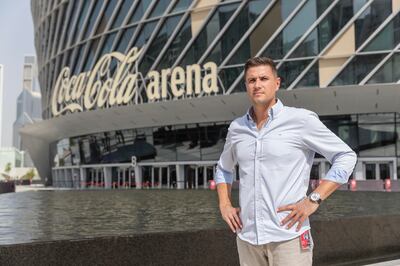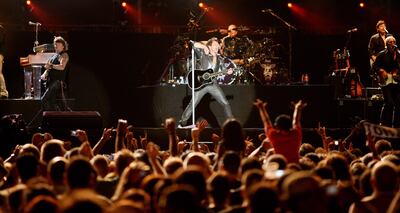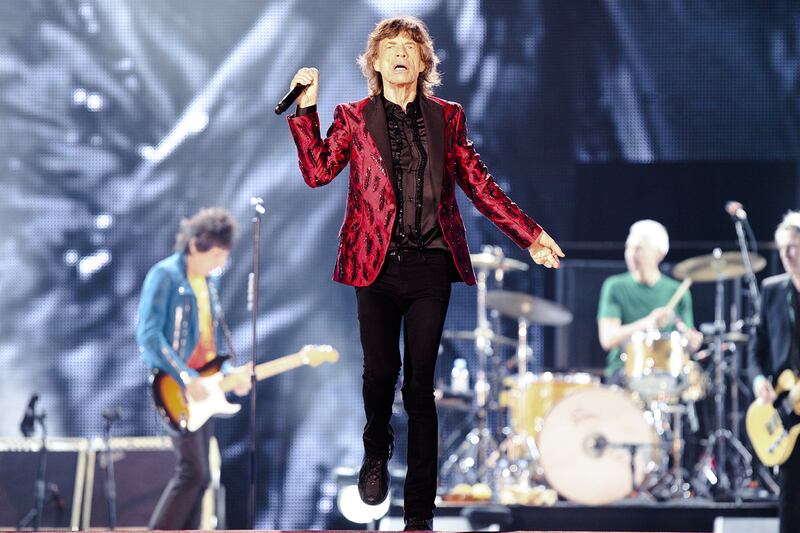The UAE live events sector is moving to a different beat as it grapples with the ramifications of the new working week.
With the UAE public sector, schools and a growing number of private businesses switching to a Monday-to-Friday week from January 1, event organisers and venue operators are seeing new opportunities and challenges ahead.
“It is hard to predict what the direct effect will be,” says John Lickrish, chief executive of Flash Entertainment, the company responsible for some of the UAE's biggest gigs, including the Abu Dhabi Formula One Grand Prix's after-race concert series.
“The music industry is still trying to restart after Covid-19 and there really hasn’t been any large-scale world tours for nearly two years. Once they begin, we will see where we fall in the mix.”
Lickrish admits the former working week (Sunday to Thursday) gave the UAE a distinct advantage in offering international artists the chance to play a well-attended show on Thursday or Friday while logistically being able to travel to Europe or South-East Asia for lucrative weekend performances.
With the country now aligned with major international markets, Lickrish says concert organisers need to be more savvy in tour negotiations.
“The UAE itself is the biggest drawcard and that has been shown in the way we handled the pandemic,” he says.
“These artists notice our high vaccination rate and the health and safety measures in place to ensure a great and safe show.”

It’s a potent argument Lickrish is wielding in the latest bout of negotiations as major artists plan their return to the road.
“When it comes to these big tours, it is all about routing and I have to admit that for years, the UAE has been an afterthought in that regard,” he says.
“I feel we can change this now. Not only have we always been well placed for a show on the way to South-East Asia, Australia or South Africa, we are an ideal location to begin a tour.
“After not going on the road for such a long time, the UAE, with its organisation and crowds, is a great launch pad for artists who may feel wary about stepping back on stage again during these uncertain times.
“We don’t want to be an add-on destination, but an important part of the tour-planning process.”
A fresh start
The UAE is fast becoming a destination for a growing number of tour openers.
On January 29, British crooner James Blunt launches his Stars Beneath My Feet World Tour at Dubai's Coca-Cola Arena.
He follows German rocker Till Lindemann who used his January 4 show to kick off a run of European concerts.
Jo Koy will also start the international leg of his Funny Is Funny World Tour at the venue on Saturday, May 14.
While Coca-Cola Arena general manager Mark Jan Kar is excited at the prospect of more tours getting under way, he is wary of relying solely on popular western acts to rejuvenate the City Walk venue.
Like most major industries affected by Covid-19, the need to diversify was crucial for the arena to weather the disruption.
Jan Kar hails the new UAE working week for complementing the strategic steps the arena took in the wake of the pandemic, some of which were hosting Bollywood and Arabic pop concerts, including sold-out concerts by Pakistani singer Rahat Fateh Ali Khan and Egypt's Mohamed Hamaki.
Those experiments began as far back as December 2020 and Jan Kar recalls that the customer data painted a promising picture.
"We found that Bollywood and Arabic shows prior to the new working week worked particularly well on Friday night," he says.
"The new changes have been a blessing in disguise because now I have the flexibility to run two proper weekend concerts, with Bollywood shows also being able to move to a Saturday and an Arabic show on Friday, due to the four-and-a-half-day working week.
“On Friday, families will now have time to pick up the kids, get home or meet friends and still go to the show."
Those moves are already being tested with the arena hosting the big Arab pop double-bill concert of Iraqi singer Kadim Al Sahir and Najwa Karam on Friday.

Another aspect the arena capitalised on during the pandemic is its multipurpose nature, allowing it to be modified from a 17,000-capacity venue to an intimate 2,000-seater. This allows promoters the opportunity to bring niche offerings on non-traditional show days.
"The Till Lindemann show was a good example in that we had 3,000 diehard fans on a Tuesday night," Jan Kar says.
"There is very much a shift in work culture in Dubai with a mass population working in the aviation and hospitality industries.
"So where a Tuesday night may be a ‘no-go’ for the traditional corporate world, we were still able to get people to come on Tuesday for a heavy metal concert.
“So there are opportunities there and this is what the arena communicates with our partners who are interested in bringing shows here."
Follow the data
Such a studied approach is suitable for BookMyShow, which grew from being an online ticketing platform to also organising shows by the likes of popular boy bands Westlife and Boyz II Men in the UAE.
With the company occasionally focusing on one-off concerts by international artists, most recently by reggae group The Wailers at Dubai Duty Free Tennis Stadium in November, the financial risks can be higher.
"This is why we always study all the shows we do and try to understand everything from what the audience expects to the kinds of venues we should be looking at," says Lawrence Harradine, BookMyShow's head of business in the Middle East.
"We study and get as much information as we can pre-show to then determine whether it’s the right show to move ahead with.”
Take it or leave it

Flash Entertainment has 12 years of data to draw from in terms market research, Lickrish says.
However, all that information gleaned from ticketing and ancillary revenues to random audience polling and surveys can mean little with regard to superstar acts.
An enduring principle immune to the effects of the new UAE working week is that the stars often call the shots when they plan a tour.
“When it comes to the massive acts, like The Rolling Stones or Coldplay for example, they can play on any day of the week in Abu Dhabi and I would be confident people will be there.
"Also these artists, they are in such high demand they can just tell promoters 'these are the days we are free in your city, so take it or leave it' because they know five others who are interested," he says.
“One of the first shows we did in Abu Dhabi was Bon Jovi back in 2008 in Emirates Palace and that was on a Tuesday night and it was amazing. Now, was that day my preferred option? Of course not, but in such situations, you do it because a big artist will always draw a crowd, no matter what day of the week.”






